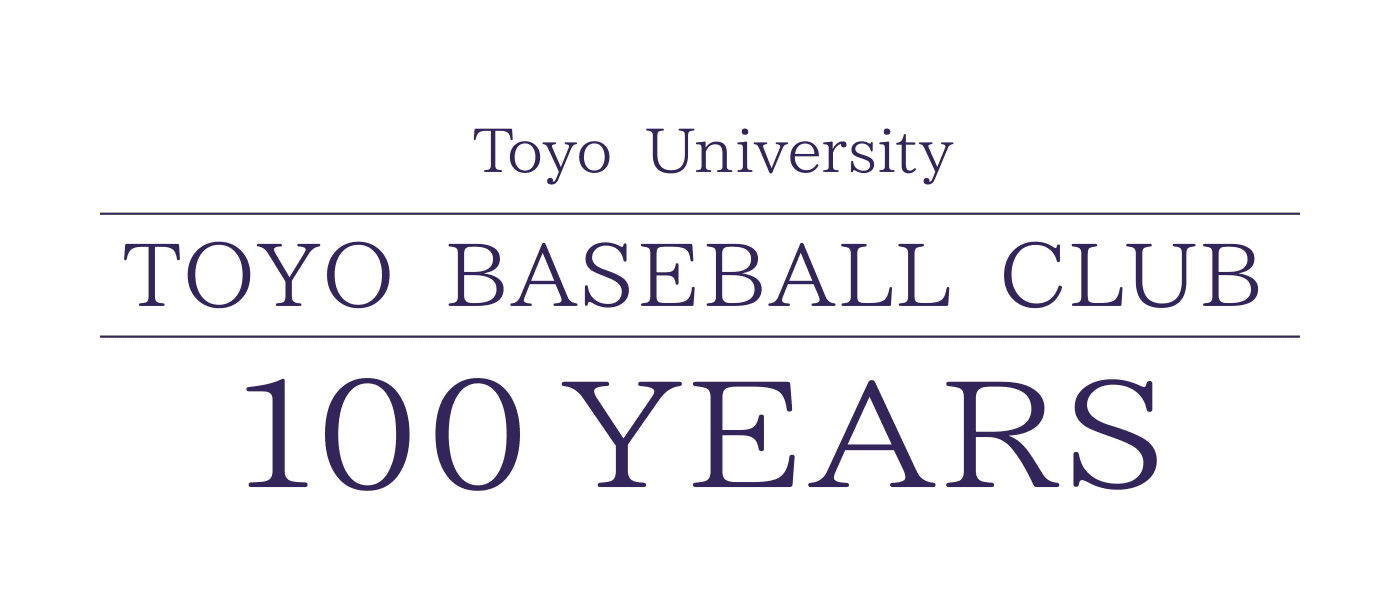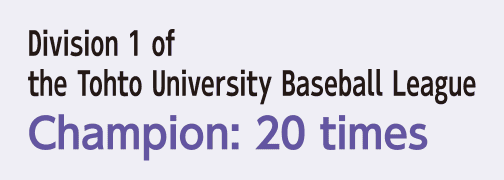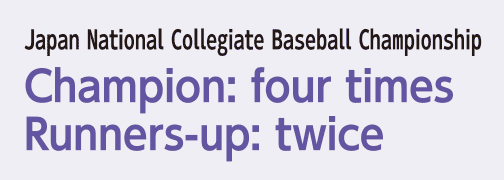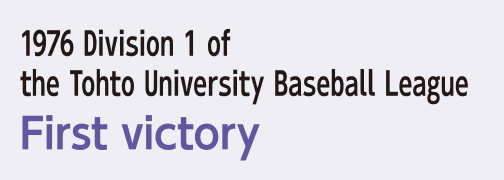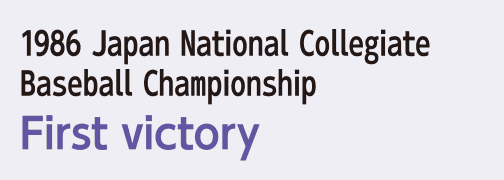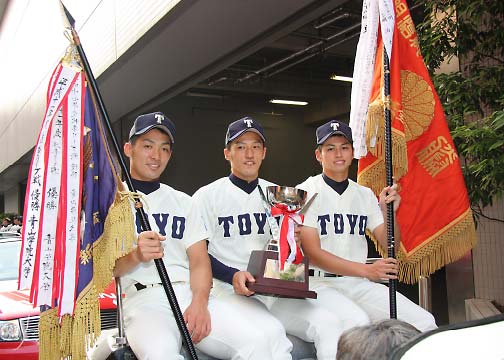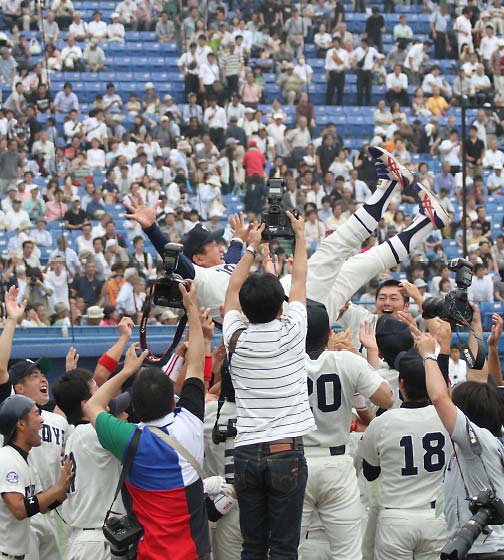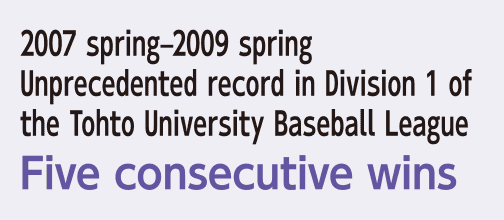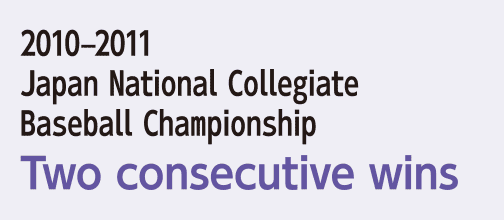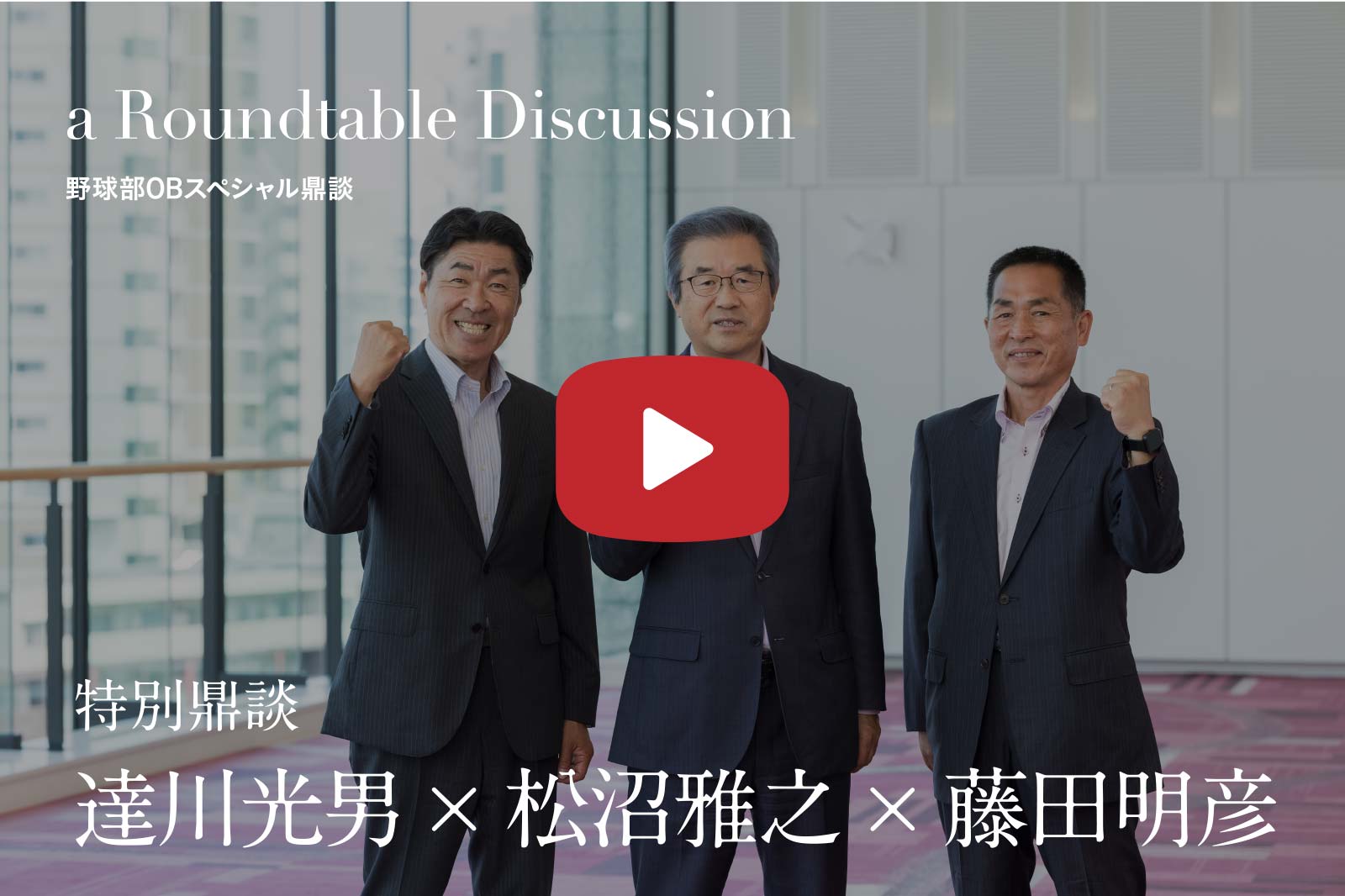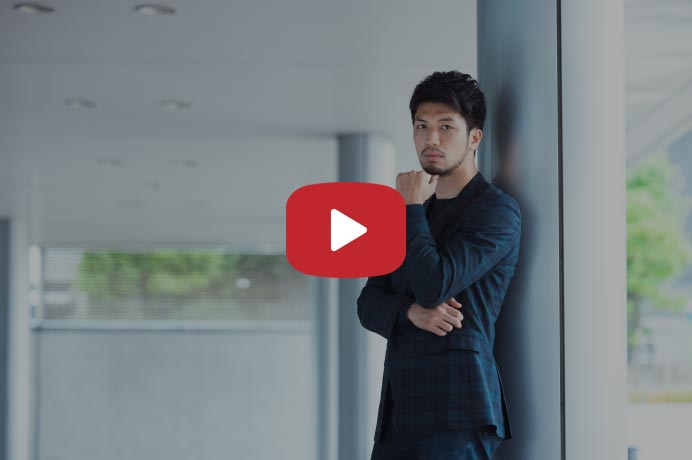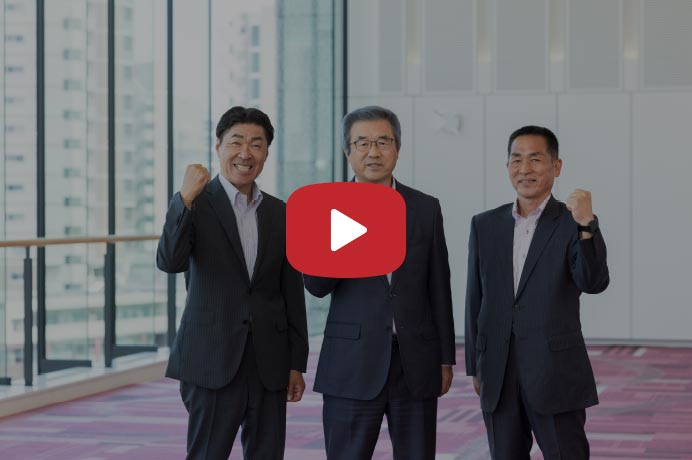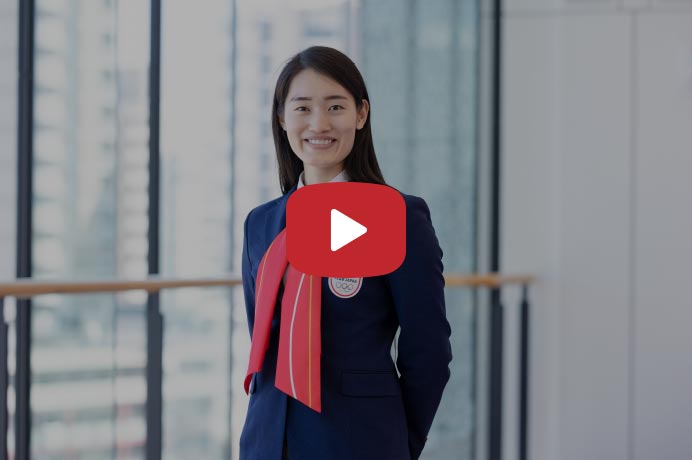- Alumni HOME
- Centennial of the Establishment of the Toyo Baseball Club
Centennial of the Establishment of the Toyo Baseball Club
The Toyo Baseball Club, which has produced many professional and non-professional baseball players and
coaches, celebrated the centennial of its establishment.
Five key people enthusiastically talk about
the past, present, and future of the Club with its brilliant track record in the Tohto University
Baseball League Championships, where fierce rivals compete.
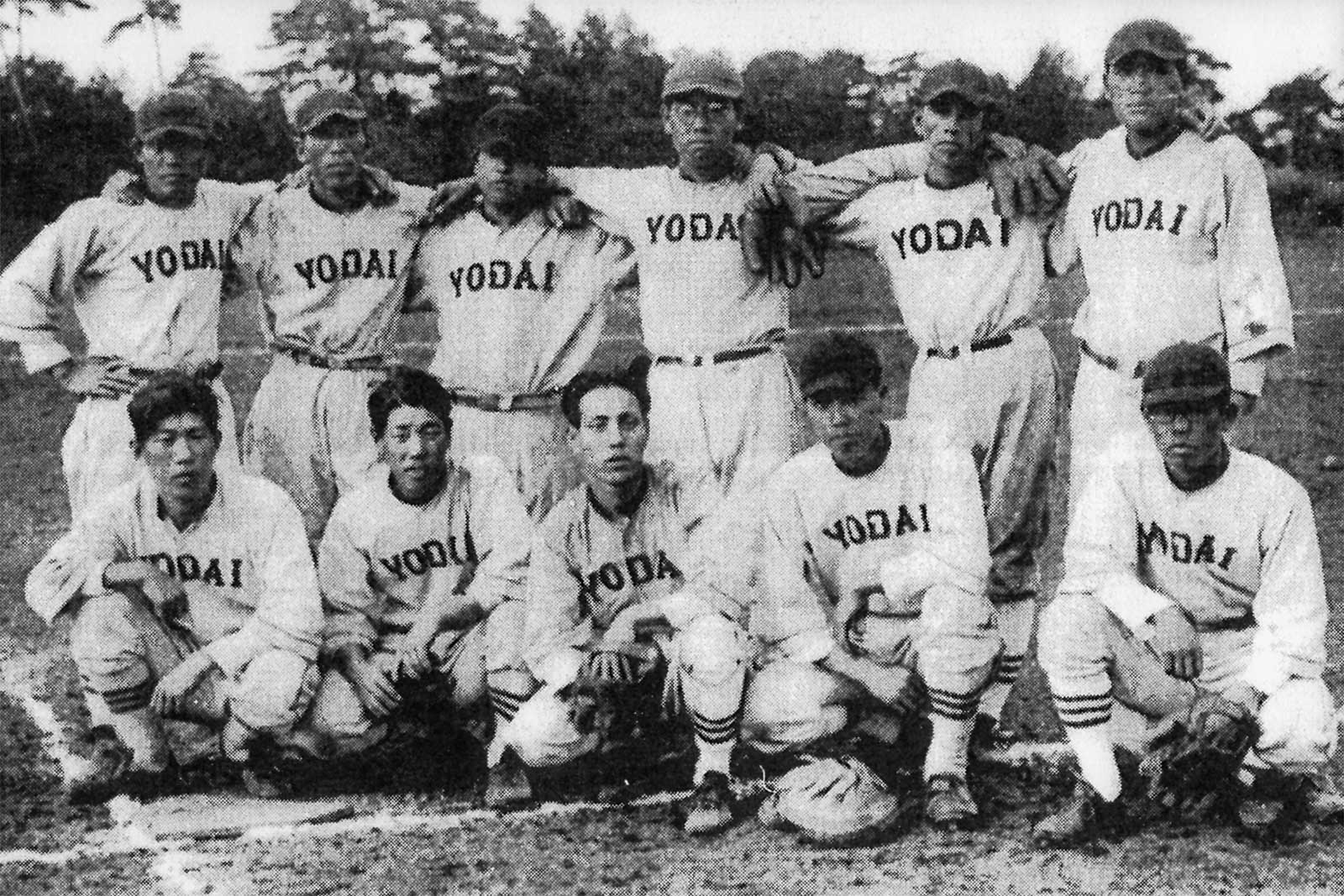
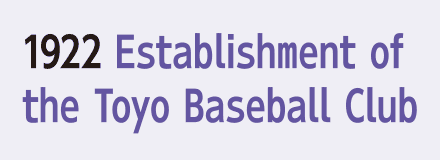
- The Toyo Baseball Club—an unofficial club in the first academic year of its establishment (1922)—was authorized by the President in 1923 and launched its activities as an official club. The Club joined the Tohto University Baseball League in 1940, and was promoted to Division 1 in 1962 for the first time.
Major records set by the Toyo Baseball Club
Active professional baseball players
who graduated from Toyo
University
(year of joining the team: team name)
- Shota Ono
- (2009: Nippon Ham Fighters →
Chunichi Dragons) - Daichi Suzuki
- (2012: Chiba Lotte Marines →
Tohoku Rakuten Golden Eagles) - Yuya Oda
- (2015: Orix Buffaloes)
- Juri Hara
- (2016: Tokyo Yakult Swallows)
- Taiga Kamichatani
- (2019: Yokohama DeNA BayStars)
- Hiroshi Kaino
- (2019: Fukuoka SoftBank Hawks)
- Kodai Umetsu
- (2019: Chunichi Dragons)
- Keita Nakagawa
- (2019: Orix Buffaloes)
- Toshiya Sato
- (2020: Chiba Lotte Marines)
- Masaru Fujii
- (2021: Tohoku Rakuten Golden Eagles)
- Shoki Murakami
- (2021: Hanshin Tigers)
- Shota Suekane
- (2022: Hiroshima Toyo Carp)
Interview
Akio Takahashi, previous manger Graduated from the Department of Economics, Faculty of Economics, in 1971
Mr. Takahashi was a catcher in his university days. Since his appointment as manager of the Toyo Baseball Club in 1972 at the age of 23, he was a great leader of the baseball club at his alma mater for 46 years. His team won a total of 18 championships in Division 1 of the Tohto University Baseball League, four at the Japan National Collegiate Baseball Championships, and two in the Meiji Jingu Baseball Tournament.
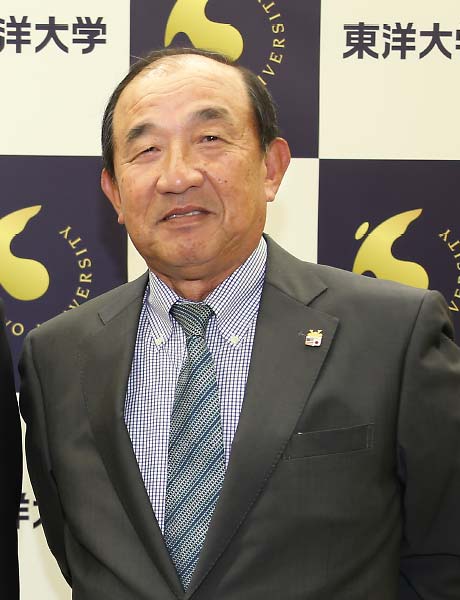
Passing on the Right Mentality to the Next Generation
Please accept my sincere congratulations on the centennial of the establishment of the Toyo Baseball Club. It was my pleasure to have been involved in baseball in the TOYO uniform for 50 years. For the four years when I was a player, our team played in Division 1 of the Tohto University Baseball League, but experienced promotion and relegation between Divisions 1 and 2 three times. Although we won each time, I still remember the air of tension at that time.
After graduating from Toyo University, I joined Nissan Motor and played baseball as a non-professional player. In the autumn of my first non-professional year, I received an inquiry as to whether I could serve as manager of the Toyo Baseball Club. At that time, the team was performing poorly due to the retirement of Manager Nomoto—my mentor—upon my graduation. I firmly declined the offer once. However, with the encouragement of both the then manager of the Nissan Motor baseball club and the then previous manager Nomoto, I finally decided to accept the offer.
When I took over as manager, the team had had two wins and 20 losses in league games during the preceding year. It took time for the team members to discover the pleasure of winning games. In the first year as manager, I devoted all my energies to improving their attitude toward training while practicing with them. As a result, from the second year, they were runners-up in five consecutive seasons. I believe the successive defeats in the final games highly motivated the team to win. The emotional experience of frustration is important for baseball players. After going through these bitter experiences, in 1976, the team achieved its long-sought first victory in the autumn league.
Before the 1976 autumn league, the team played an away game. An episode occurred there also indelibly impressed me; the captain of a non-professional team was taking the initiative in grooming the baseball field. I told my team to follow this example. I think this episode was a turning point in my team building efforts. Being a college senior is no reason to receive special treatment. It is important for a team to make a concerted effort together.
In team building, I was willing to use freshmen in games because accumulating experience from an early stage allows players to grow. In addition, I provided coaching in such a way that the team members practiced on their own initiative. Even for running, practice swings, and other basic training, those who employed their ingenuity in each training program could make progress.
The slogan of the Toyo Baseball Club is “Justice, Consideration, and Competitive Spirit.” I kept telling my team to always be fair, honest, hardworking, and earnest. Based on this policy, I placed importance on batting. It is true that good fielding and good tactics are required to win a game, but winning with an offensive attack is more exciting.
Baseball is fun. I want the current players to thoroughly enjoy their baseball, and I hope that the team will win the national championship in the near future.
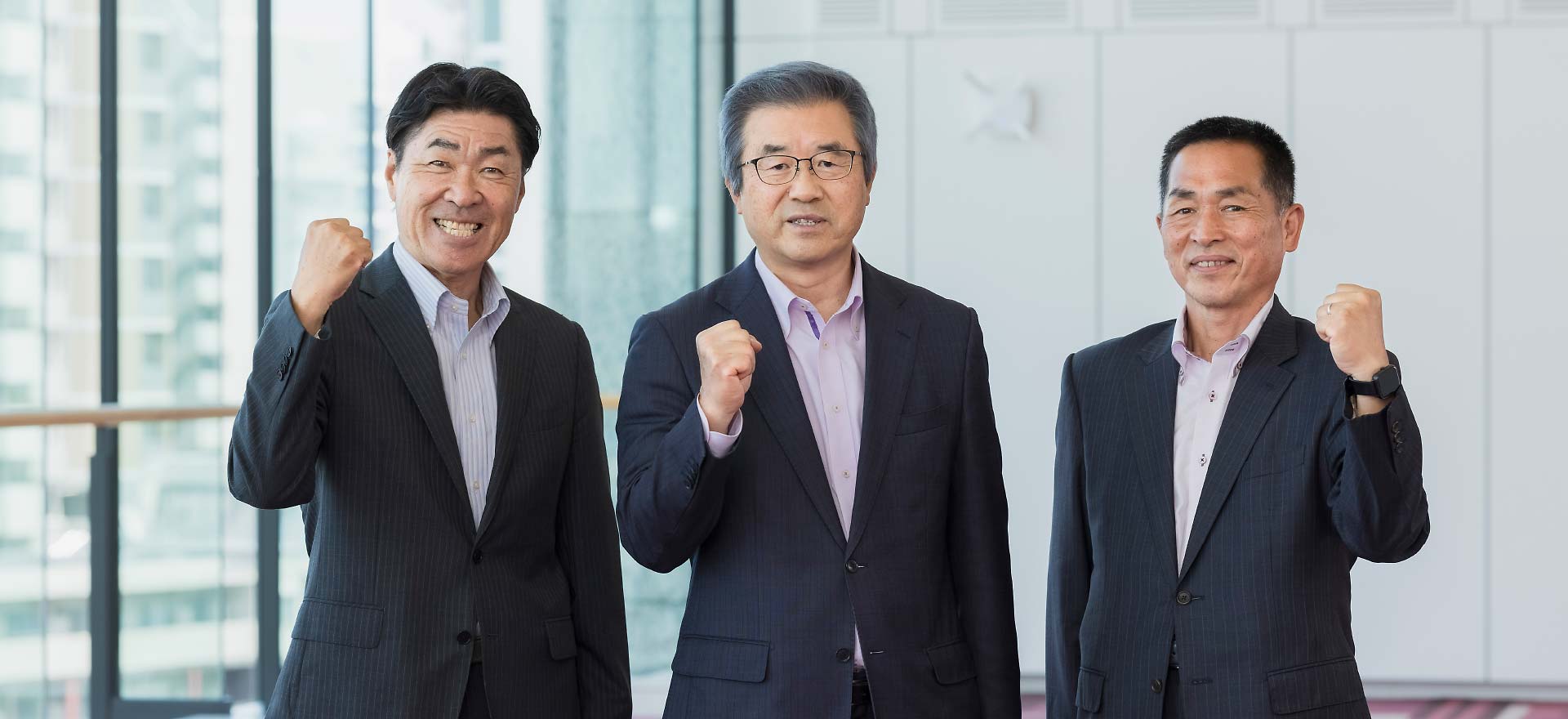
a
Roundtable
Discussion
Special Trialogue Mitsuo Tatsukawa × Masayuki Matsunuma × Akihiko Fujita
Passing on the Spirit of Toyo
In the autumn of 1976, the 37th year after joining the Tohto University Baseball League, the Toyo
Baseball Club achieved its long-sought first victory.
The three leading players at that time talked about their memories of those days.
Surprised at the tough practice, far harder than that at senior high school
What surprised you the most after joining the Toyo Baseball Club?
- Tatsukawa:
- Tough practice above everything else. Training at my alma mater, Hiroshima Commercial High School, had also been very hard, but at Toyo University it was much harder. Living in a dorm for the first time, I curled up in a corner of my room.
- Fujita:
- Matsunuma and I were one year behind Mr. Tatsukawa in university. The long hairstyles of my seniors surprised me the most.
- Matsunuma:
- I played baseball at Toride Second High School in Ibaraki Prefecture under the guidance of Manager Yukio Kiuchi. At that time, the total number of team members was only 16. However, Toyo Baseball Club had more than 80 members in total, which was overwhelming.
- Tatsukawa:
- Matsunuma started university after the graduation of his brother (Hirohisa Matsunuma) with whom I formed a battery. Hirohisa had been a strict senior. Therefore, I was impatiently waiting for Matsunuma to join the club, with the intention of paying him back for what his brother had done to me. But watching his great pitches made me think, “I have to be nice to this pitcher.” Ha ha.
- Matsunuma:
- Thank you.
- Tatsukawa:
- He had good control and threw a heavy ball. I thought that Matsunuma’s good pitching would enable the team to win a championship. As for batters, Fujita was excellent. He was a genius with the bat.
- Matsunuma:
- Mr. Tatsukawa’s decision about what pitch to throw was on another level. I got away with pitching just by following his signs
Tenacity to win planted by Manager Takahashi
- Tatsukawa:
- Manager Takahashi was still in his 20s and very strict. Immediately after I joined the baseball club, he asked me, “What do you want to be in the future?” I remember my answer was “I want to be a professional player.” Thanks to his tough coaching, I could be a professional baseball player. I can’t thank him enough.
- Fujita:
- Manager Takahashi was committed to winning games. Practice after losing a game was very tough. He planted tenacity to win in our minds.
- Matsunuma:
- Manager Takahashi liked players difficult to deal with and used them to the fullest extent possible. I am grateful to him for allowing me to play in games even when I was a freshman.
- Tatsukawa:
- Manager Takahashi was very soft on Matsunuma. It was obvious that the team could not win a championship without Matsunuma’s good pitching.
- Matsunuma:
- Manager Takahashi allowed me to pitch in many games. I took the mound in 85 games in four years.
- Tatsukawa:
- At that time, in the Tohto University Baseball League, Komazawa University had outstanding strength.
- Matsunuma:
- When I was a freshman, I always got hammered.
- Tatsukawa:
- In the Tohto University Baseball League, the team at the bottom of Division 1 must play a promotion/relegation game with the winning team in Division 2. To avoid this, we had no choice but to go up against our opponent with all our might in each and every game.
- Matsunuma:
- To me, losing the first game meant taking the mound in three consecutive games.
- Tatsukawa:
- Manager Takahashi was a sore loser, but he never said, “Win!” in a straightforward manner.
- Matsunuma:
- We were in big trouble when we lost, though. Ha ha.
Do you think Manager Takahashi built his team through trial and error when he was in his late twenties?
- Fujita:
- He also changed daily life rules in midstream. Drinking, smoking, and playing mahjong were banned. Even seniors were required to shave their heads.
- Matsunuma:
- Manager Takahashi declared his determination: “I will do as I like.” He himself participated in fungo fielding drills, whereby we made few errors. My consecutive scoreless innings record (56⅔ inning streak) was largely attributable to the fielding of the team.
- Tatsukawa:
- I believe that Manager Takahashi decided to do his best. He told us that he was ready to resign any time. Consequently, he served as manager until the age of 70.
- Fujita:
- I admire him for having led the team with a strong will.
- Tatsukawa:
- As many as 47 of his former students became professional baseball players. He is nothing less than great manager.
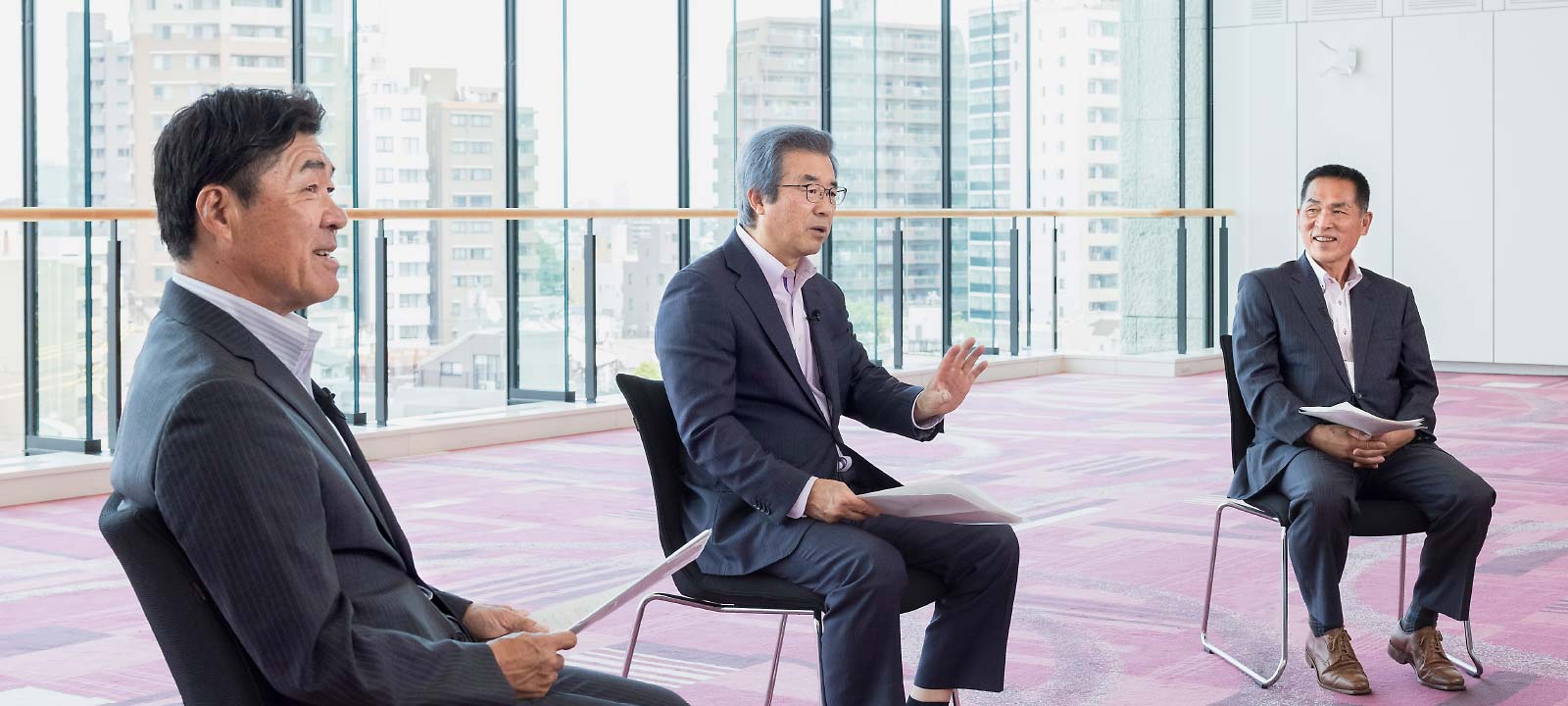
Successful career after graduation attributable to the four years at Toyo University
In autumn 1976, the team achieved its first victory in the league.
- Tatsukawa:
- I still remember very well the game in which we won the championship. Although it was in the daytime on a weekday, so many students visited Meiji Jingu Stadium that I wondered what had happened. In high school, my team won the championship in the Koshien tournament (annual nationwide high school baseball tournament). The championship won at Meiji Jingu Stadium was something different from winning at Koshien. Winning in the university league was more impressive to me.
- Fujita:
- In the latter half of the league games, I could not participate in practice due to an injury. Fortunately, however, I was allowed to take part in the championship game, which we won. I remember that I hit an RBI single.
- Matsunuma:
- Maybe because I devoted myself fiercely to pitching, I hardly remember the game, but I remember I didn’t feel my pitches would become hittable.
- Tatsukawa:
- When we won, I was glad to have taken good care of Matsunuma. Ha ha. After my graduation, Matsunuma and Fujita, as the ace pitcher and captain, respectively, led the team to its second victory in autumn 1978. Matsunuma, how many wins did you register over the four years?
- Matsunuma:
- 39 wins (currently ranked second in the Tohto University Baseball League in terms of total number of wins).
- Tatsukawa:
- That is utterly amazing! You must have learned a lot during the four years in the Toyo Baseball Club.
- Fujita:
- I believe my baseball career after graduation is attributable to those days when I immersed myself in baseball.
- Matsunuma:
- Thanks to strenuous training at university, I never felt that professional baseball practice was tough.
In closing, please give a message to your juniors.
- Tatsukawa:
- Do your best at Toyo University, for sure.
- Fujita:
- I want you to trust your training at university, immerse yourself in baseball, and win a championship before graduation.
- Matsunuma:
- I currently serve as a club coach. University baseball is not the goal of your baseball career. You still have far to go after graduation. You may be able to unleash your potential someday. Even if things do not turn out the way you want, it is important not to give up until the very end.
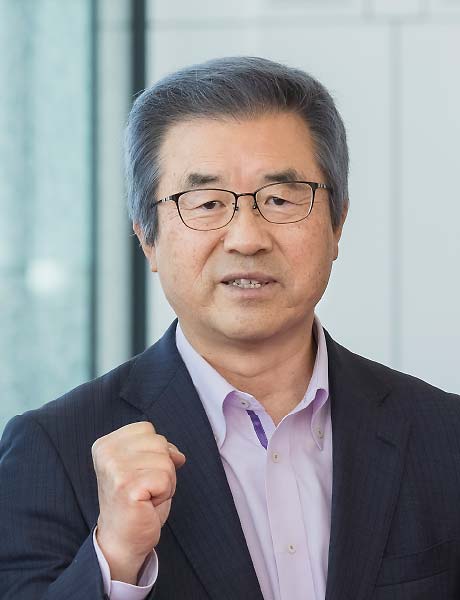
- Mitsuo Tatsukawa
-
Graduated from the Department of Commerce, Faculty of Business Administration, in 1978
After graduation, Mr. Tatsukawa joined the Hiroshima Toyo Carp. As a regular catcher, he contributed to three championship wins. After retirement, he served as manager of the Hiroshima Toyo Carp and also as a coach of other professional baseball teams. At present, he works as a baseball commentator.
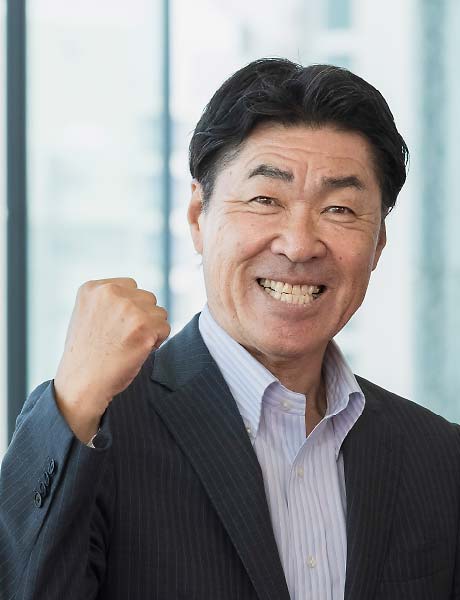
- Masayuki Matsunuma
-
Graduated from the Department of Commerce, Faculty of Business Administration, in 1979
After graduation, Mr. Matsunuma joined the Seibu Lions (currently known as the Saitama Seibu Lions) and served as a star pitcher during the 1980s, the golden era of the Seibu Lions. After retirement, he has worked as a baseball commentator and a coach of non-professional teams. At present, he is a coach at Toyo University.
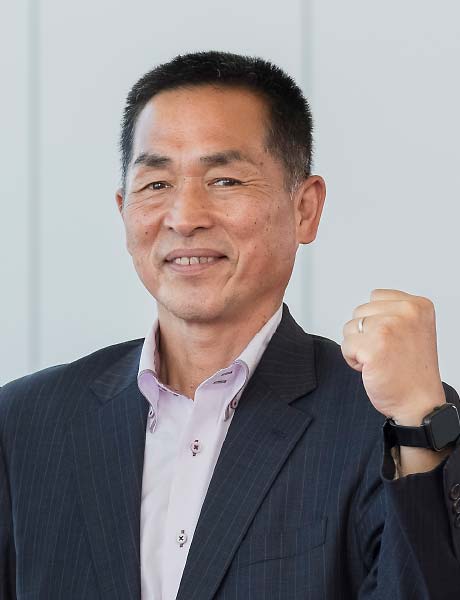
- Akihiko Fujita
-
Graduated from the Department of Commerce, Faculty of Business Administration, in 1979
After graduation, Mr. Fujita served as a player, coach, and manager of the Toshiba Fuchu Baseball Club. He also served as manager of the baseball club at his alma mater, Toyo University Himeji Senior High School. His team qualified to participate in the Koshien tournament (an annual nationwide high school baseball tournament) five times. Having developed many students into good players, he took honorable retirement after the National High School Baseball Invitational Tournament held in March 2022.
Interview
Toyo Baseball Club Manager Yasuhiko Sugimoto Graduated from the Department of Business Administration Law, Faculty of Law, in 1983
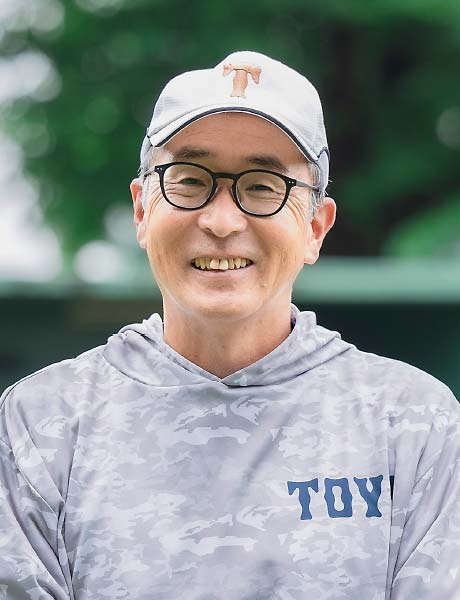
Building a New Era
I have been manager of the baseball club at my former university since 2018. Since the day I took over the manager’s position, I have been thinking that the history made by Manager Takahashi and the significance of what he did are beyond my reach. What I have to do as one of his former students is to examine what he did for the baseball club over many years, determine as many good points as possible, and pass them on to the next generation as the tradition of Toyo University.
Manager Takahashi kept saying, “Work very hard in all seriousness. Play fair.” This is the most important rule to follow for human beings and I also apply this rule thoroughly as a good tradition.
What I have newly introduced is one-on-one meetings with team members. Prior to a meeting, which are held three times a year, I ask the members to fill out a commitment sheet in terms of what they want to be and what they are going to do to that end. What is written on the sheet shows the talents of the member and their way of thinking. For those who use some abstract expression, I ask them to articulate it. For those who use a stereotyped expression, I ask them whether or not those are their own words. I, of course, check how they carry out their tasks individually. If there is a gap between their tasks and their approach to those tasks, I do follow-ups.
I do not talk much to the team members as I want them to think what to do on their own. Exercising their independence on many occasions will be of great help after they graduate university. I learned this approach through my experience of working in a managerial position at a company. Although I am demanding of my team members, I want my team to be not only strong but also dignified.
For the current team, it is not just a dream to achieve five consecutive wins in the Division 1 league, which is the record set by Manager Takahashi’s team. Some people say that in baseball, results are all that matters, but I do not agree with that. The most important thing is the process—what each member thought and did to win. With an eye toward the future of the team members, I desire to build a team full of hope that enables each member to make their dream come true.
- CONTENTS -
- MOVIES -
-
Special Interview
Ryota Murata -
Special Trialogue
Mitsuo Tatsukawa
Masayuki Matsunuma
Akihiko Fujita -
Athletes to Watch
Asa Ando
